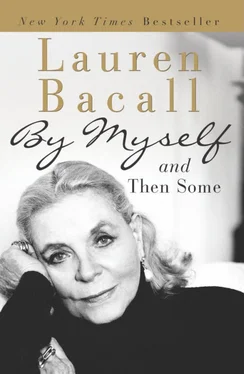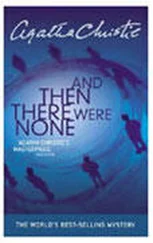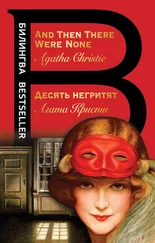My restlessness with regular school was due to the fact that I wanted to get on with real life – or away from real and on to pretend. I cut classes three times one week – once to go to the zoo, the other times for Bette Davis – and wrote a note saying I’d been ill and signed my mother’s name. I always got to the morning mail first, but one morning I didn’t. There was a letter from the principal’s office saying I’d been out and they’d like to speak with Mother. What a scene! My tears – ‘Oh, Mother, forgive me, I’ll never do it again.’ Mother asking how I’d got away with it. My confession to signing her name to a note. She: ‘Don’t you know that’s against the law? That you can go to jail for that?’ What was it in me – why and how was I able to do such things? For a girl who was dedicated to truth, it was most strange. Was it just mischief? Or was it a streak of my father – perish the thought! It reminded me of a time when I was about eleven. My friends and I used to walk through the five-and-ten-cent store. That’s what it really was then, you could buy almost everything for five or ten cents. As I had no money, I used to look at all the appetizing items on the counters and imagine which I would buy. On one counter were pencil cases – cheap little pencil cases, but I’d never had one and I wanted one so badly. So badly that I took it. I suppose most kids have done something like that once in their lives – there’s so much to see, to buy. And when you don’t have the money, so much that is beyond your reach – even a silly pencil case. I went home as usual and Mother noticed the case. She took me by both arms, looked at me, and said, ‘When did you get this pencil case?’
‘I found it.’ Eyes slightly off center.
‘Where did you find it?’
‘On the street, Mother.’
‘You’re lying, Betty. It’s brand new. Now tell me where you got it.’
My chin trembled – I couldn’t help it – I was caught, and frightened of what I had done. ‘I took it from the five-and-ten,’ in the smallest voice – a voice only birds could hear
‘Well, you are going right back there and return it. And when you return it you are to give it to the woman behind the counter, tell her that you took it, and apologize.’
‘How can I ever do that? I’ll be punished! Can’t I just put it back on the counter and leave?’
‘No – you do as I say. Let this be a lesson to you. Taking what isn’t yours is stealing – it’s against the law. If you return it now, they will do nothing to you.’
She walked with me to the store, went in with me, and quietly stood to one side while I made my confession. The woman took it back, and it was an experience I never forgot – nor was it ever followed by another like it. Facing a situation head on was the only way to deal with anything. I learned the lesson early. My mother gave me a solid foundation. Any little quirks along the way were my own. It was hard growing up. (It’s still hard.)
I studied journalism at Julia Richman to fulfill a momentary dream of becoming a reporter. It must have been the result of a comic strip – that and seeing His Girl Friday . Years before when I saw a rerun of Loretta Young in The White Parade , saw how beautiful she was, how brave, how dedicated, I knew I would be a nurse. That is until my first sight of blood and the wave of nausea that accompanied it. The nursing dream became a thing of the past.
All this came from wanting so desperately to be someone – something; to have my own identity, my own place in life. The best thing about dreams is that youth holds on to them. I was always sure mine would come true – one of them, anyway. Clearly my fantasies resulted from my identification with movies and certain stars. Like the time I had seen Margaret Sullavan in a movie. She was a wonderful actress and I loved her looks. I wanted to look like that. My hair was long – it had been for years. Time for a change. But my mother and grandmother would be furious, so I pondered for days. Finally I decided I’d pondered enough. Time for action. I was to have my hair trimmed. Mother gave me the money. I took off for the shop. I was so excited – I’d leave 86th Street looking like me, I’d return looking like Margaret Sullavan. Thrilling. I sat in the barber chair and told the man what I wanted – I had a small photograph of Margaret Sullavan with me. He looked at me and said, ‘Are you sure that’s what you want?’ ‘I’m sure. Cut it all off.’ He picked up his scissors and began. One side went and I looked cockeyed. It was awful, but it would be lovely when both sides were done. They finally were. I looked in the mirror. The hair was Margaret Sullavan, all right – very short, just below the ears, bangs – but the face was still mine. The two definitely did not go together. But it was too late now, there was nothing for it but to go home and face the music. I walked in the door and when my grandmother saw me she gave a horrified scream, as did my mother. ‘Are you crazy – cutting that beautiful hair? Whatever got into you?’ ‘All I wanted to do was look like Margaret Sullavan. I love it – I’ve had my long hair long enough. I’m not a baby anymore.’ But it was awful – I looked hideous and I hated it. But it would grow back – I hoped. Fortunately, it did before I had finished high school. I was an awkward mess anyway, the hair just added to the picture.
Movies were accessible to me, of course – they were the cheapest entertainment form that I knew – twenty-five cents for entry. My exposure to the theatre was almost non-existent, as I could simply not afford it. I was given a very special treat in 1939 – seeing John Gielgud as Hamlet. The combination of John Gielgud, Shakespeare, and a Broadway theatre was almost too much for me. The feeling of walking into a legitimate theatre – the shape of it, the boxes, balconies, upholstered seats, and the curtain with the magical stage behind it. What seemed like thousands of people crowded inside. So this was what a real theatre was like! It lived up to every vision I had ever conjured up in my mind. I reached my seat, program clutched in hand. The house lights dimmed – the chatter ceased – the entire audience was focused on the stage – the hush – the feeling of awe – and the power actors have to affect people’s lives while they sit in a theatre. At the rise of the curtain one could feel the expectation, the concentration of everyone in that house. What followed depended on what was given by the actors – they could do almost anything, they could lead an audience anywhere, make them feel anything. The power of it – it was unforgettable. That day I was transported for two and a half hours from my perch high in the balcony. Even the wave of applause that came at the end of each act did not shake me back to reality. Would I ever come close? Was there any way for me to be anywhere near that good? Gielgud’s performance was so affecting that, despite my youth and my inability to understand Shakespeare’s language totally, I left the theatre in a complete daze, bumping into people, being stepped on, unaware of where I was. Since then, of course, I have realized that Gielgud’s Hamlet was one of the great performances of all time. And I can still see the beauty of that head and his total immersion in his role. It took some time for me to return to my reality. Leslie Howard was also playing Hamlet at a nearby theatre. Curious that I missed that – except rumor had it that he was not so good in the role. Perhaps I didn’t want to face less than perfection in my hero.
G raduation at last — the end of school and the beginning of the pursuit of my destiny. We were photographed for the yearbook, called Spotlight , and alongside each photo was a two-line phrase meant to be the key to our personalities. Mine said, ‘Popular ways that win. May your dreams of being an actress overflow the brim.’ I briefly thought of going to college – another fantasy – campus life (all romance, no work) – but there was no real point in pretending, I was not meant for football games and sorority life. It all had nothing to do with my goal, so I gave it up very quickly and painlessly.
Читать дальше












